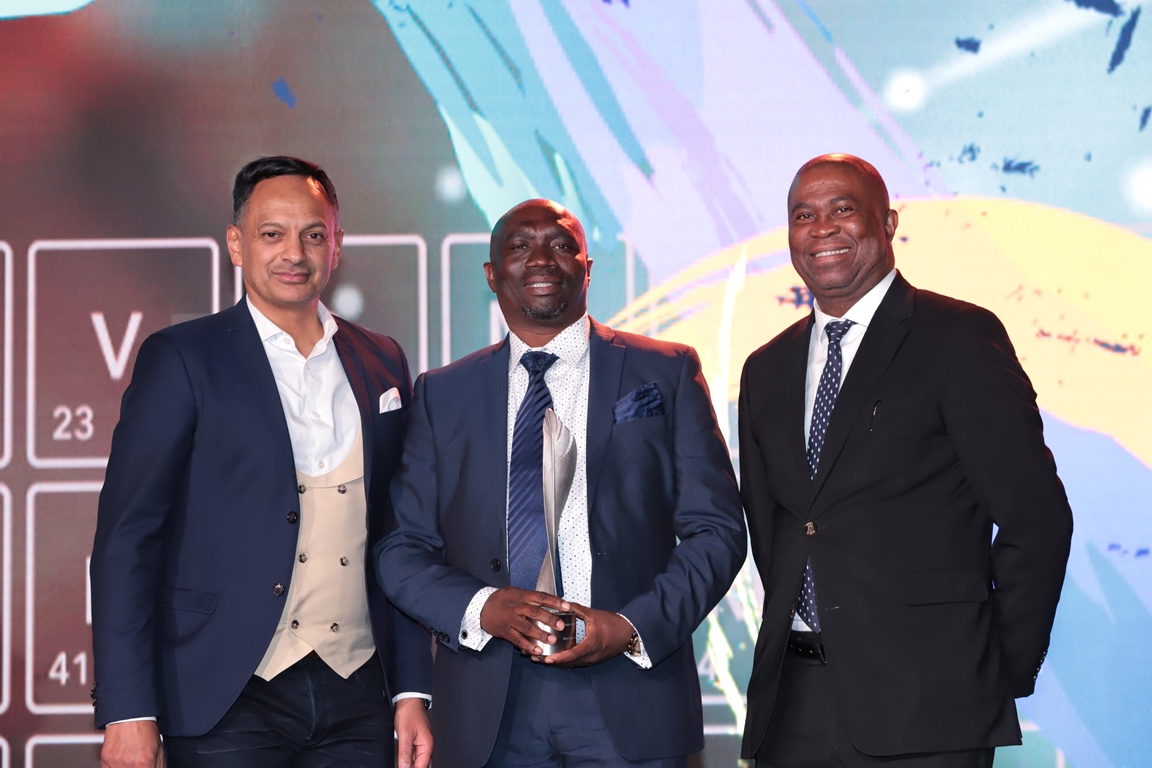CSIR’s Dr Happy Sithole scoops prestigious NSTF Award
Dr Happy Marumo Sithole, Centre Manager for the National Integrated Cyberinfrastructure Initiative (NICIS), has won the Management Award at the National Science and Technology Forum (NSTF)-South32 Awards. He was also a finalist for the Data for Research Award. Dubbed the ‘science oscars’, the NSTF awards were established in 1988 to recognise outstanding contributions to science, engineering and technology (SET) and innovation in South Africa. The glitzy event took place on 27 June 2019 at the Emperors Palace Conference Centre.
Dr Happy Marumo Sithole, Centre Manager for the National Integrated Cyberinfrastructure Initiative (NICIS), has won the Management Award at the National Science and Technology Forum (NSTF)-South32 Awards. He was also a finalist for the Data for Research Award. Dubbed the ‘science oscars’, the NSTF awards were established in 1988 to recognise outstanding contributions to science, engineering and technology (SET) and innovation in South Africa. The glitzy event took place on 27 June 2019 at the Emperors Palace Conference Centre.
Dr Sithole won the Individual Award under the sub-category: Contribution through management and related SET activities over the last five to ten years. The award is made for a contribution to SET and innovation through management and activities other than the research itself. It includes all other contributions that are often necessary for the successful development and diffusion of new or improved products, processes or services such as: Managerial activities including management of training and education, technical activities including the development of commercial and financial activities. Dr Sithole won this prestigious award for spearheading the development of the Centre for High Performance Computing (CHPC) and leading it to the level of a world-class entity.
In his congratulatory message to Dr Sithole, Dr Fulufhelo Nelwamondo, Executive Manager: CSIR Next Generation Enterprises and Institutions said, “Dr Sithole’s leadership has ensured world recognition of South Africa's high performance computing (HCP) capabilities. On behalf of the Next Generation Enterprises and Institutions, a well deserved and warm congratulations to Dr Sithole for winning the Management Award”.
Entrenching use of high performance computing in South Africa
Established in 2007, the CHPC began with under 10 staff members and an IBM E1350 Cluster which registered a performance of 2.5 Tflops. Once established, the plan was to encourage the use of high performance computing in the country. Under the management of Dr Sithole, the CHPC worked closely with the South African National Research Network (SANReN) to provide broadband access to users. The centre used several tactics to develop high performance computing in South Africa. This included partnerships with industries and the international community to fast track the development of skills and capacity in the country.
Between 2007 and 2014 the CHPC established two-year funding grants for 11 flagship projects across a number of research domains, with each project’s aim being to solve a major scientific or socioeconomic challenge in South Africa and in Africa,. using the centre’s computational resources. The use of HPC resources provided training and exposure to parallel computing and set the ground for the development of additional HPC capacity in South Africa. These programmes helped to demonstrate value for the funders on the importance of HPC in the country, and also accelerated the development of skills, where increase and efficiency in HPC utilisation was realised. Currently HPC systems are running at over 80%, all the time.
The second approach was to introduce a rigorous human capital development programme. The centre offered and still offers internships, studentships and year-round training courses to its users to ensure they make optimal use of the resources. The CHPC Winter School, usually attended by about 100 students, is a favourite among computer science and computer engineering students across South African universities.
The third plan was the establishment of the Student Cluster Competition. In 2012 the centre introduced the Student Cluster Competition as a component of its Winter School. During the competition, students are introduced to parallel programming and taken through the various aspects of the competition. They are then divided into groups and given an assignment that determines which groups will proceed to the national competition that takes place at the annual CHPC National Conference in December. The winning national team proceeds to represent the country at the lnternational Supercomputing Conference’s Student Cluster Challenge held annually in Germany.
The fourth tactic was the launch of the annual CHPC National Conference. The conference serves to showcase the work done by the centre each year through the research that is performed by the users. It also provides a platform for users to gain knowledge of the advances in HPC through carefully selected plenary speakers and hands-on workshops and tutorials. Furthermore, the conference also provides opportunity for users to provide feedback on the centre's infrastructure.
Lastly, the focus was on the visibility of the centre to the international community, where CHPC systems are benchmarked amongst the best in the world, and have been listed in the TOP500 supercomputers in the world. The work of the centre in building the HPC capability in the continent, in partnership with other international organisations, saw the growth of HPC in many African countries. Dr Sithole has donated infrastructure, and skills development, through training programmes; and also provided strategic advice to the governments in these countries. His involvement is also in multi-lateral organisations, such as the Brazil, Russia, India, China and South Africa (BRICS) Working Groups in HPC and Astronomy.
The CHPC of today
Today, the centre has 35 staff members and Lengau, a supercomputer which operates at one petaflop. It falls under NICIS, together with other pillars of South Africa’s cyberinfrastructure system, namely, SANReN and the Data Intensive Research Initiative of South Africa, known as DIRISA. They are involved in major national and international research initiatives and are now headed by Dr Sithole as of April 2019.
In his acceptance speech, Dr Sithole thanked his family and colleagues for the support provided to him over the years. “I am really honoured to receive this award which I firmly believe is from team work. The CHPC team has put a lot of effort in ensuring this development happens. We also owe it to our research community, international partners and the broader African continent researchers. I believe we have a lot to do and you are all the winners of this award,” he added.

flanked by Hoosain Karjieker, CEO of the Mail and Guardian (left) and
Dr Phil Mjwara: Director General of the Department of Higher Education, Science and Technology.


